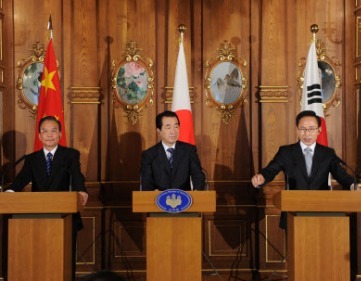TOKYO (Yonhap News) -- Leaders of South Korea, Japan and China agreed Sunday to establish an early notification system for nuclear accidents, strengthen the sharing of related information and take other steps to bolster cooperation in handling disasters.
Nuclear safety and disaster management were the top topics at the annual summit of South Korean President Lee Myung-bak, Japanese Prime Minister Naoto Kan and Chinese Premier Wen Jiabao, as host Japan is still reeling from the aftermath of March's massive earthquake, tsunami and nuclear crisis.

"As the three nations are geographically close, a nuclear accident or disaster in one nation could have substantial and psychological effects on the people of all three nations," Lee said at a joint news conference. "It is an important achievement for us to agree to strengthen information sharing and other cooperation on disasters, including nuclear accidents."
The three countries adopted a joint summit declaration summing up their discussions, which pledged to promote cooperation not only on nuclear safety and disaster management but also on economic, security, regional and international issues.
They also adopted annex documents specifying cooperative steps in nuclear safety, disaster management and sustainable growth, promising to start discussions on "establishing an early notification framework and exchanging experts," and to share information on radiation-spreading atmospheric currents and their movements at times of accidents.
They also agreed to ensure quick information sharing at times of disasters, send relief teams and supplies as early as possible, strengthen cooperation in recovery efforts and conduct joint anti-disaster drills.
Japan used the three-way summit as a chance to demonstrate that the country is bringing the disaster situation under control and to drum up support for recovery efforts, causing Lee and Wen to visit Fukushima, home to the quake-damaged Fukushima Daiichi nuclear power plant that is still spewing radiation, on Saturday.
Lee and Wen were the first foreign leaders to visit the region since the March 11 earthquake and tsunami struck the power plant, causing damaged reactors to leak radiation in the world's worst nuclear accident since the 1986 Chernobyl disaster.
During the visit, Lee not only comforted displaced residents, but also tasted, before a barrage of camera flashes, cherry tomatoes, cucumbers and other vegetables produced in Fukushima in a symbolic gesture displaying solidarity and underlining the safety of foods produced in the nuclear accident-stricken region.
Earlier Saturday, Lee also visited the tsunami-razed northeastern region of Sendai, offering flowers, holding a moment of silence before the rubble of destroyed homes and meeting with residents rendered homeless in the massive disaster.
At Sunday's summit, the three leaders also agreed to complete a joint study at an early date into the possibility of forging a three-way free trade agreement, welcoming the progress made in setting up a joint secretariat to be established in Seoul later this year to handle cooperation projects, officials said.
They also shared the importance of seeking sustainable growth through using renewable energy and improved energy efficiency. They agreed to strengthen policy dialogue and human exchanges on the issue, they said.
On North Korea, the leaders expressed concern over Pyongyang's uranium enrichment program and agreed that the right dialogue atmosphere should be created before restarting the six-party talks on the nuclear standoff and that inter-Korean talks should precede the nuclear talks.
South Korea has urged the North to take concrete steps demonstrating its denuclearization commitment and apologize for last year's two deadly attacks before resuming the stalled nuclear talks that bring together the two Koreas, China, Japan, Russia and the U.S.
Lee was to later meet separately with the Japanese and Chinese leaders.
The main topics of Lee's meeting with the Japanese prime minister are expected to include Japan's agreement to return ancient Korean royal books, disaster management and humanitarian assistance to Japan, Seoul officials said.
The meeting with the Chinese premier is expected to include discussions on the possibility of launching bilateral free trade talks and ways to commemorate the 20th anniversary next year of diplomatic relations between the two countries, they said.
North Korea is also expected to be high on the agenda for Lee's talks with Wen, as the meeting will come after the North's leader, Kim Jong-il, has been confirmed to be making a trip to China, his third in a little more than a year.
South Korea has also been waiting for Pyongyang's official response to Lee's offer to invite the North's leader to an international security summit in Seoul next year if Pyongyang firmly commits to nuclear disarmament.
South Korea, Japan and China have alternately hosted three-way summits annually since 2008. China will host next year's meeting.
The combined gross national products of the three countries account for nearly 20 percent of the world's total gross domestic products, and their combined population represents 22.3 percent of the world's population.











![[Today’s K-pop] BTS pop-up event to come to Seoul](http://res.heraldm.com/phpwas/restmb_idxmake.php?idx=644&simg=/content/image/2024/04/17/20240417050734_0.jpg&u=)
![[Graphic News] More Koreans say they plan long-distance trips this year](http://res.heraldm.com/phpwas/restmb_idxmake.php?idx=644&simg=/content/image/2024/04/17/20240417050828_0.gif&u=)




![[KH Explains] Hyundai's full hybrid edge to pay off amid slow transition to pure EVs](http://res.heraldm.com/phpwas/restmb_idxmake.php?idx=652&simg=/content/image/2024/04/18/20240418050645_0.jpg&u=20240419100350)

